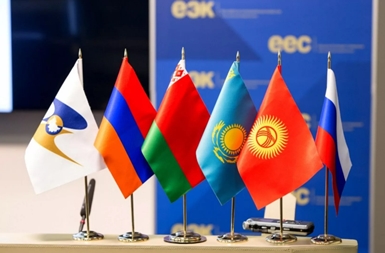A meeting of the Supreme Eurasian Economic Council was held in the capital of Kyrgyzstan. The summit of the EAEU leaders took place against the backdrop of a difficult geopolitical situation and the pressure of harsh sanctions against two of the five members of the union. This context has become a serious test of strength for the association, which, against all odds, continues to live and is trying to expand ties and increase trade volumes.
Obviously, the Russian-Ukrainian war has made its own adjustments to the activities of the EAEU. The sanctions restrictions imposed by the collective West on Russia had a significant impact on the dynamics of economic cooperation between the participating countries.
Taking into account the deterioration of relations between the participants of the association, there were suggestions about the possible collapse of the Eurasian Economic Union. Distrust grew towards the Russian partner, who turned out to be more unpredictable than expected. International sanctions hit the economy of the entire union hard, collapsing the national currencies of the participating countries and driving inflation to a record high.
Such a difficult context makes the participants of the association forcefully look for new formats of cooperation and channels of communication with third countries.
Despite this, the historically established trade and economic relations among the concerned countries do not allow to radically stop and curtail the existing regional projects in an “instant”. With all the disagreements and aggravating circumstances, integration still works and brings results.
This is well understood by the President of Kazakhstan, Tokayev, elected for a new seven-year term. As an experienced diplomat and negotiator, he knows exactly how to play in difficult conditions while maintaining balance. Therefore, it is he who becomes the headliner in this game according to the new rules.
The locomotive of positive processes in the EAEU over the past year has obviously become Kazakhstan, as a rare player today that has maintained normal relations with all participants in geopolitical combinations in the region and beyond.
“Only timely and bold decisions can help in the search for new growth points in trade and the economy. To form a modern and efficient infrastructure for the sale of products in the border regions of Kazakhstan, a system of trade hubs is being created for the entire Eurasian space,” Tokayev said at a recent forum of cross-border bilateral cooperation with Russia.
Under the new approaches, the President of Kazakhstan understands, for example, pairing the capabilities of the EAEU with the potential of transnational corridors within the framework of the One Belt, One Road initiatives and the North-South route. This opens up completely new prospects for the countries of the Eurasian Five to increase exports and form joint production chains with the countries of the Belt, monetary and investment cooperation, as well as interaction in the digital sphere.
Uzbekistan is worth a separate stop. The country in 2020 received observer status in the organization and since then has been systematically deepening and expanding cooperation with partners in the EAEU. Among the latest initiatives that the expert community is already actively discussing is the possible formation of a “triple gas union” of Kazakhstan, Russia and Uzbekistan.
According to economists, the “gas initiative” can bring benefits not only to these three countries, but also in the future to the entire EAEU through the formation of a single energy market and the involvement of new partners in the integration association.
All these points make up a far from complete list of issues that were on the agenda of the summit in Bishkek. But they alone are enough to understand that the states of the Eurasian Economic Union are aimed not only at continuing, but also at expanding cooperation, despite all the circumstances and negative forecasts.
Cons, of course, can be found in everything. Of course, in membership in the EAEU, they will be found for each participant. This is, alas, how integration works: you sacrifice little to get more.
And given the whole range of geopolitical and economic circumstances that have developed today, it must be said that there are simply no alternatives to the EAEU that would provide opportunities for cooperation in the post-Soviet space on the same scale.
This means that the participating countries will have to negotiate, look for those very “new points of growth” and make those very “timely and courageous decisions” in order not only to survive, but also to succeed in the new picture of the international order.
And they will have to do it together, of course. ///nCa, 14 December 2022
